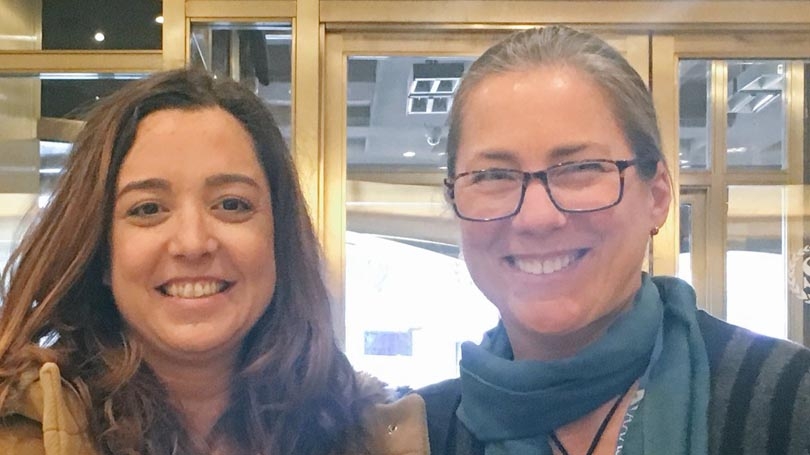Almost everyone growing up in America in the 1960s remembers the U.S.-Soviet space race with the two Cold War superpowers locked in escalating tensions. Cooperation seemed impossible, but at the close of the Vietnam War the relationship thawed, paving the way for the historic “handshake in space” during the first joint U.S.-soviet space mission in 1975. The Apollo-Soyuz Test Project, which catalyzed decades of U.S.-Russian space cooperation, is a pivotal example of what is known as science diplomacy – the use of science as common ground to promote international relationships and to resolve shared challenges. A more recent example of science diplomacy for the advancement of science is the creation of the Synchrotron-light for Experimental Science and Applications in the Middle East (SESAME) laboratory in Jordan in 2017.
Science diplomacy is becoming ever more vital as science can be used to inform diplomatic agreements between countries. Many of the important global issues we face today – from climate change and the spread of infectious diseases to nuclear disarmament – cross national borders and are scientific in nature. Solving these modern challenges requires a combination of scientific expertise and international collaboration.
Dr. Marga Gual Soler is a leading international expert in science diplomacy. During a recent visit to Dartmouth, Dr. Gual Soler shared insight into her profession, and her commitment to developing the next generation of science diplomats.
Holding a PhD in molecular cell biology, Dr. Gual Soler interned at the United Nations where she realized that scientists should be actively discussing global scientific challenges alongside diplomats and policymakers. Driven by a desire to use her scientific background to make a significant impact on the diplomatic stage, she followed a career in science diplomacy and is the Senior Project Director at the Center for Science Diplomacy at the American Association for the Advancement of Science (AAAS), where she leads global science policy research and education initiatives.
As part of this role, she manages the AAAS-Cuba science diplomacy program. In 2014, the AAAS and the Cuban Academy of Sciences made a historic agreement to advance scientific cooperation between the U.S. and Cuba, and now Dr. Gual Soler works to carry out the scientific collaboration delineated in the agreement. She reflects, “my training in biomedical sciences, the cross-cultural awareness provided by my international experiences, and my bilingual proficiency in English and Spanish happened to be the right combination for this project. Unknowingly, I had acquired the right set of skills and experiences of a ‘science diplomat’… When I left academia, I could have never imagined that someday I would be able to use my scientific skills to help improve relationships between two countries that have been enemies for nearly six decades.” Her work on this project highlights the importance of fostering international scientific collaborations to hopefully pave the way for political change.
Dr. Gual Soler was invited to visit Dartmouth by Dr. Melody Brown Burkins, another leader in science diplomacy who is actively involved in preparing future science policymakers and diplomats. Dr. Burkins is the Associate Director for Programs and Research at the Dickey Center for International Understanding and Adjunct Professor of Environmental Studies at Dartmouth.
After completing her PhD at Dartmouth in earth and ecosystem sciences, Dr. Burkins was awarded an AAAS Science & Technology Policy Fellowship. This fellowship provided a valuable opportunity to access the diplomatic landscape in Washington, D.C., where she later worked as environmental policy advisor to Senator Patrick Leahy.
Dr. Burkins currently serves on numerous national and international governing boards and working groups. Her priorities include promoting science policy advocacy, international scholarship, sustainability initiatives, and women’s empowerment and equality. She has made significant contributions to advancing women’s leadership in global science organizations, which have historically lacked female representation. In 2016, Dr. Burkins became the first woman to lead a U.S. delegation to the International Geographical Congress (IGC). As part of this leadership role, she assembled a historic majority-female U.S. delegation to the IGC. Dr. Burkins also facilitated an important merger between two international science organizations, the International Council of Science and the International Social Science Council.
At Dartmouth, Dr. Burkins provides mentorship to students interested in science policy and diplomacy, and she serves as the faculty mentor of the Science Technology and Engineering Policy Society (STEPS), a student-run organization at Dartmouth. The focus of this group is to promote learning and career development in science policy, offering many opportunities to interact with policymakers and advisors. Dartmouth offers various policy-related courses, as well as conferences and workshops through the Dickey Center related to science diplomacy. A list of these and other resources can be found below.
If you are interested in pursuing a career in science diplomacy, we encourage you to become involved in STEPS as a first… step! The society is an ideal venue for students to learn about policymaking and diplomacy. Previous events have included science policy mini-conferences, lunches with invited speakers, and trips to Capitol Hill on congressional visit days. For more information, visit the STEPS Facebook page and website, or contact the group at STEPS@Dartmouth.edu.
Science Diplomacy Resources
Organizations and courses at Dartmouth:
Science Technology and Engineering Policy Society (STEPS)
Policy-related courses
Conferences and workshops hosted by the Dickey Center
Articles by Dr. Marga Gual Soler about her journey:
How I Became a Science Diplomat
From the Lab Bench to the UN
Courses, fellowships and other resources:
AAAS Center for Science Diplomacy
AAAS Science Diplomacy Online Course
AAAS Science and Diplomacy Journal
AAAS Science Diplomacy and Leadership Workshop
AAAS and The World Academy of Sciences (TWAS) Summer Course on Science Diplomacy
Hurford Science Diplomacy Initiative at Rockefeller University
Science and Public Policy Journal
AAAS Science & Technology Policy Fellowships
Science Embassy Fellows Program
